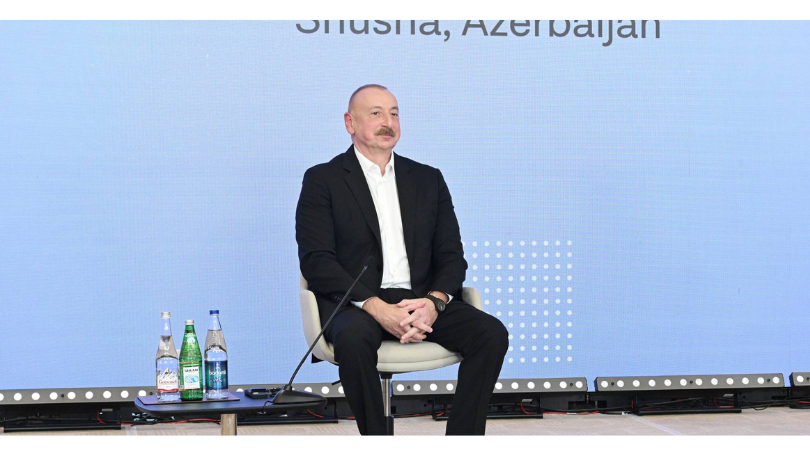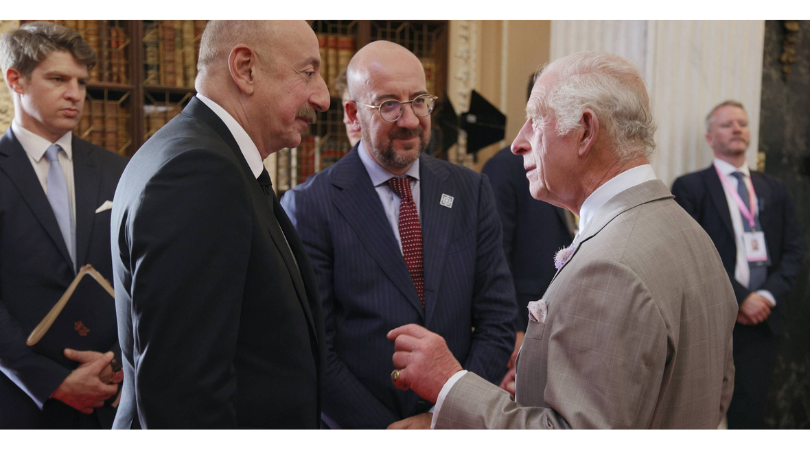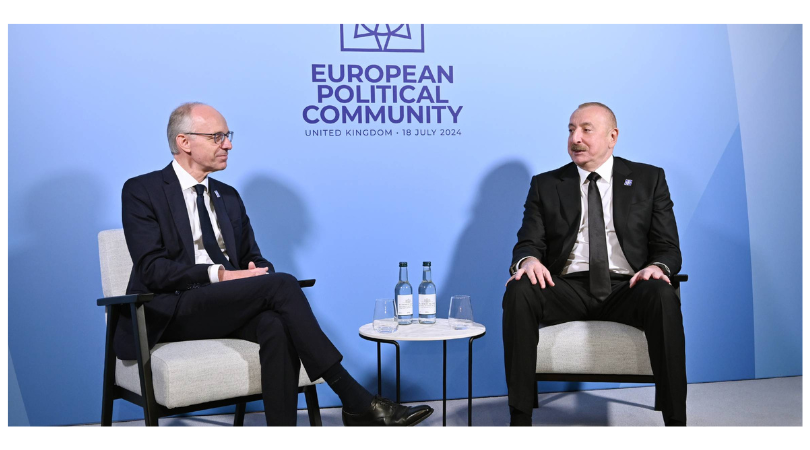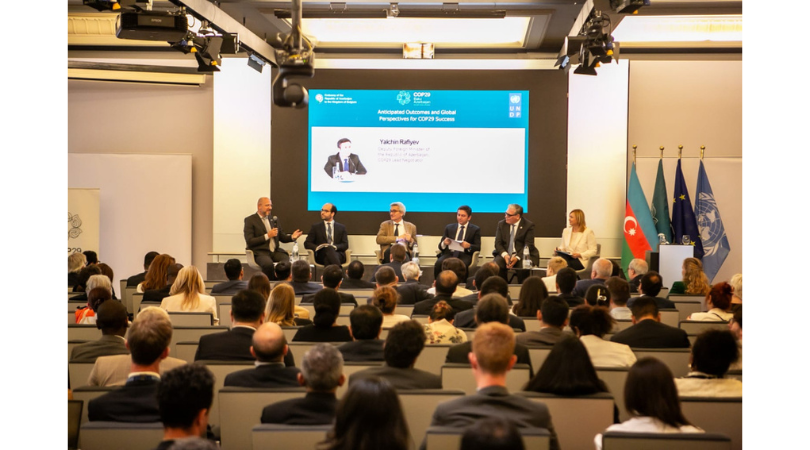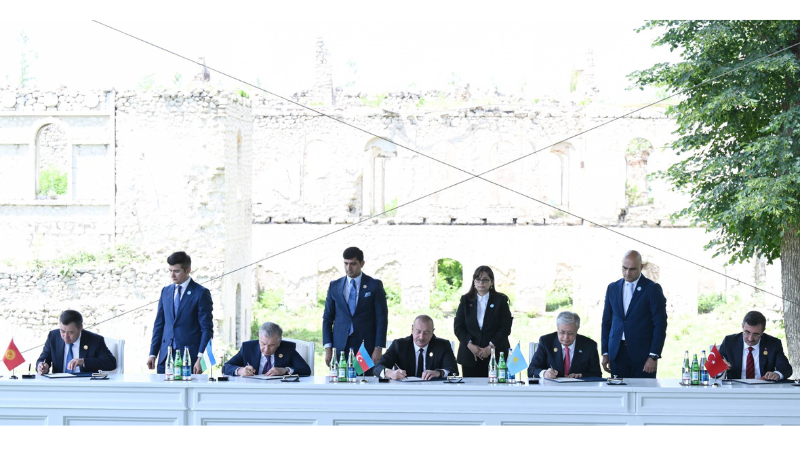Interview of Ambassador Fuad Isgandarov to the EurActive web-news portal
Azerbaijan’s relations vis-à-vis Europe should concentrate on creating future perspectives and overcoming current challenges, the Azarbaijani Ambassador to Belgium, Fuad Isgandarov, told EurActiv in an exclusive interview.
Fuad Isgandarov previously served as Ambassador to the Netherlands, and as an ambassador-at-large. He also served as Deputy Minister of Azarbaijan's Ministry of National Security.
Isgandarov spoke to EurActiv’s Senior Editor, Georgi Gotev.
EU-Azerbaijan relations reached a low when the European Parliament adopted a very harsh resolution in September. What has happened since?
Azerbaijan expressed its clear and firm position on the future of EU-Azerbaijan relations even before the EP resolution, during the Riga Summit. We remain focused on the bilateral format of cooperation, where both parties can exercise equal partnership and accommodate mutually agreed priorities of cooperation.
Unfortunately, the post-Riga period registered some trends which repeated itself again in terms of negatively influencing our bilateral relations. We have always advocated for constructive dialogue, even with a critical content, (and) consistently encouraged the EU to abandon the language of unilateral statements and resolutions.
Unfortunately, some EU institutions have transformed constructive dialogue into a lecturing monologue. But we are not students. That’s why the National Parliament of Azerbaijan decided to entirely suspend its cooperation with the European Parliament at its current status, and to withdraw from the Euronest Parliamentary Assembly. Moreover, it also resulted in postponing the consultations on the draft Strategic Partnership Agreement upon the decision of the government of Azerbaijan.
Speaking about this resolution, I notice that the largest political group, the European People’s Party (EPP), voted mostly against this resolution. Basically the S&D, ALDE and the Greens voted for, and the EPP against. I heard people in the EPP group saying “We just lost one country," after the vote. Don’t you think Parliament President Martin Schulz should feel responsible?
It’s strange that Azerbaijan has become the issue that could split the big coalition between the S&D and the EPP. I was really surprised, but yes, there is something to think about.
The current trends in the neighbourhood of Europe show that nobody is perfect in this world. While every single time our EU partners use an opportunity to diminish Azerbaijan on artificially inflated grounds by constantly repeating its unilateral resolutions and statements, tthe political capital of the EU is becoming one of the most unsecure cities in Europe, and the fleeing of hundreds of thousands of refugees has become the worst calamity since World War II.
However, even in such a difficult time for the EU, the government and the National Parliament of Azerbaijan, with more than a million refugees and over 2,000 perished citizens as a result of terrorism, has never used this or other problems to lecture, excessively criticize or downgrade the EU institutions. If you look at our record, it is quite to the contrary. In fact, like in the aftermath of 9/11 tragedy, Azerbaijan, being traditionally a secular Muslim society, was one of the first countries which mobilised its moral, political and military will to fight against terrorism. We are ready to help our European friends now, as we did for many years.
But as a diplomat, you know that the other EU institutions are very different from the Parliament. With its last Communication concerning the review of the European Neighbourhood Policy, I think the Commission responded to Azerbaijan affirmatively. It adopted a more flexible, more differentiated approach toward the countries in its neighbourhood.
We took note of the Joint Communication on the Review of the European Neighbourhood Policy, which gives us a chance to identify the EU’s projections on its engagement with partner countries. We also took note of the EU’s desire to enter into bilateral discussions to find how the EU and Azerbaijan can work together in the future. Our vision on the revision of ENP strategy which we submitted during the consultations period will maintain its guiding role in elaboration of our stance in future bilateral negotiations.
We all should clearly acknowledge that there are issues that cannot be a subject to compromise. Several countries of the Eastern Partnership are facing externally imposed armed conflicts and territorial claims that resulted in military occupation, ethnic cleansing, and forced population displacements. These conflicts are caused and accompanied by flagrant violations of human rights and fundamental norms and principles of international law, in particular those relating to the sovereignty, territorial integrity, and inviolability of the internationally recognized borders.
Those principles are and should remain at the core of our relations with the EU and with each other amongst partner countries. Therefore, the ENP concept, its toolbox, and objectives should clearly reflect and reinforce the respect for those principles. But unfortunately, this was not the case in the implementation of the previous ENP.
Let’s take the Riga Summit as an example. At the Summit, we saw a clear case of how a double-standard approach in preparing joint documents can create a disappointment, even a discouragement about the whole ENP instruments or mechanisms of cooperation. The Riga Summit showed attempt to cast a shadow on the inviolability of those principles. Azerbaijan still expects that whatever happens next with the Eastern Partnership, the EU will submit itself to a full support and a respect of principles of international law with regard to all – I stress again – not selected ones, but all ongoing conflicts in the Eastern Partnership region. If we want to have a working and a credible format of the ENP, there simply should be no place for double standards amongst us.
You have a neighbour, with which you are technically at war. Do you think Armenia is behind the negative campaign against your country?
Of course Armenia is also behind this campaign, but Armenia is not an independent country, at all. We feel an attempt of some forces to divert Azerbaijan from the European perspective. If Azerbaijan goes towards Europe, even if not so much politically, but mostly economically, this is seen as a serious threat by Armenia. Because they will be alone in this region. Turkey is a candidate country, Georgia is an associated member of the EU, Azerbaijan will be, I am sure, a strategic partner of the EU. What will be the value of Armenia for Europe in this situation?
In its Communication on the review of the European Neighbourhood Policy (ENP), the names of three countries of the Eastern Partnership appear repeatedly, and the names of the other three don’t appear at all. Those that appear are Ukraine, Moldova and Georgia, and those absent from the 20-page long document are Azerbaijan, Armenia and Belarus. How would you comment?
It’s up to the EU to create rankings. For us, it is not a competition and we are not competing with anyone. We are going our own way. Neither ENP, not the Eastern Partnership, can and should replace a genuine bilateral cooperation between the EU, EU member states and Azerbaijan. Let’s admit that it is not necessary to be put inside the box of European Neighbourhood Policy or Eastern Partnership to have relations with the EU. We don’t want to stop ourselves at those limitations.
Our approach is totally different. We are going for the Southern Gas Corridor (SGC), more than 50% of the TANAP project [TANAP is the SGC pipeline section across Turkey] has been constructed, and more than 50% of our trade turnover is with the EU. Business is going in the right direction. Hopefully, SGC will be realized in 2019-2020. For some forces acting in EU arena, it is the last chance to prevent such kind of scenario. But I am absolutely sure that this game is not in the interest of Europe and not in favour of good neighbourhood relations.
If someone is not in favour of SGC, it’s clearly Russia...
We don’t compete with anyone, especially Russia in the area of energy supplies for the European Union. Russia has been there with own big volumes and big projects in Europe for decades. Russia is the biggest supplier of natural gas to Europe, particularly to Germany. Its volumes exceed our potential 10 times. We are not competing in volumes. We are planning to supply the EU with only 10% of the volume it receives from Russia. But there are other big suppliers as well, for example Norway, Algeria, etc.
So, if one claims that Azerbaijan competes with Russia, then the same could be mistakenly said about its competition with other suppliers. Then it would mean that Azerbaijan wants to compete with all existing suppliers. This is a primitive approach and doesn’t hold a truth. Our intention is to secure a market access and create a commercially viable model for our energy supplies. By the way, some of the supplies are not solely those of Azerbaijan, but also of multinational companies.
This issue should not be politicised. For us, it is business. Maybe for some in the EU, it is about politics, conflict of political interests. Not for us.
If it is only business, what does policy of Azerbaijan vis-à-vis Europe mean?
Briefly – creating future perspectives and overcoming current challenges. First of all, as Ambassador, I am committed to strengthening relations between the EU and Azerbaijan, based on very strong, deep, future-oriented cooperation, based on real and irreversible economic ties, which should result in a strategic partnership. This is about perspectives.
As we all understand now, the most part of challenges and threats of terrorism take place in the neighbourhood of the EU. We learn a lot from experiences, but those tragedies should have never happened in the first place for us to wake up only now and recognize how serious those challenges are. But what went wrong with the previous ENP, and why was gap analysis done so late at such a high cost? I would like to emphasize that the revision of the ENP, especially its east dimension, was first suggested by Azerbaijan years ago, much earlier than it was decided by the EU itself.
Baed on this experience, I would like to stress that first of all, for Azerbaijan the revision of ENP can be a deliverable only if in the context of Azerbaijan. It is based on a genuine strategic partnership agreement, the draft of which we submitted to the European Commission in May of this year. We can go ahead with discussion of it. However, we will be ready to do so only if we have certainty about perspectives and results of negotiations.
But obviously more needs to be done from your side in the field of reforms.
We are working on it. But if you think that Azerbaijan does it as a result of pressure from outside, it is an absolutely wrong approach. For example, dozens of former officials were recently arrested in Azerbaijan because of corruption and fraud. What does it show? It shows that Azerbaijan is able to provide reforms, based on its own strong will and purify itself from bad things.
I would like to ask my EU friends: if Azerbaijan can do it, why is the EU unable to clean its own institutions from leeches? Scandals of corruption, money embezzlement by government officials, use of excessive force against journalists, xenophobia, Islamophobia, wide spread lobbyist activities in all institutions are also featured in Europe nowadays. But we don’t interfere with so called “naming and shaming” approach as some EU institutions did in our case. The only thing which we want to do is to be closer to EU, especially in such difficult times for Europe.
Closer relations with EU in current situation could make your life even more difficult.
Probably. Azerbaijan is a more secure country to live than most European ones. In this situation, we demonstrate our full, real and clear support to antiterrorist activity of our Western partners. It is challenging for the young, secular but Muslim state, located in such complicated region of the world. But it is our choice. Friendship is not a “glass of water”, which could be half full or half empty depending on the situation. It should be always full of confidence and trust. That is our approach. We expect the same from our European partners.

